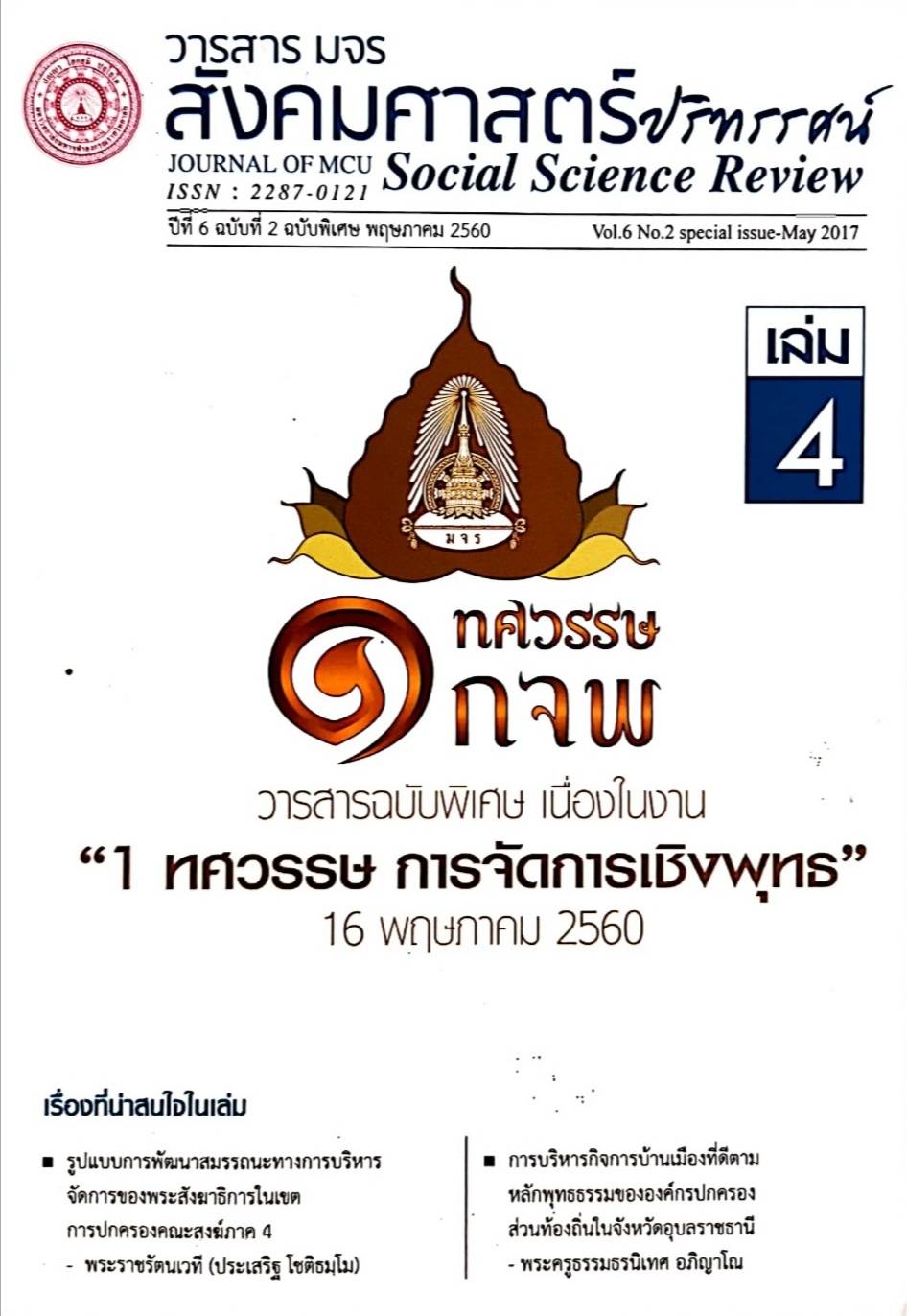ภาวะผู้นำเชิงพุทธเพื่อบูรณาการพัฒนาชุมชนในจังหวัดน่าน
คำสำคัญ:
ภาวะผู้นาเชิงพุทธ, การพัฒนาชุมชน, จังหวัดน่านบทคัดย่อ
การวิจัยฉบับนี้มีวัตถุประสงค์ คือ 1. เพื่อศึกษาคุณลักษณะภาวะผู้นำของผู้นาชุมชนใน
จังหวัดน่าน 2. เพื่อศึกษาปัจจัยที่มีความสัมพันธ์กับคุณลักษณะภาวะผู้นำเชิงพุทธเพื่อบูรณาการ
พัฒนาชุมชนในจังหวัดน่าน และ 3. เพื่อนาเสนอการพัฒนาภาวะผู้นำเชิงพุทธเพื่อบูรณาการพัฒนา
ชุมชนในจังหวัดน่าน การวิจัยเป็นแบบผสานวิธี ระหว่างการวิจัยเชิงปริมาณ และวิจัยเชิงคุณภาพ เครื่องมือวิจัย
เชิงปริมาณ ใช้แบบสอบถามซึ่งมีค่าความเชื่อมั่นทั้งฉบับเท่ากับ 0.981 ในการเก็บข้อมูลซึ่งผู้วิจัยได้
เก็บข้อมูลด้วยตนเองกับกลุ่มตัวอย่างคือ นักพัฒนาชุมชน จานวน 94 คน ในจังหวัดน่านทั้งหมดเป็น
กลุ่มตัวอย่าง วิเคราะห์ข้อมูลโดย คือ ค่าความถี่ ค่าร้อยละ ค่าเฉลี่ย ส่วนเบี่ยงเบนมาตรฐาน และการ
ทดสอบสัมประสิทธิ์สหสัมพันธ์แบบเพียร์สัน ในส่วนของการวิจัยเชิงคุณภาพใช้เครื่องมือคือแบบ
สัมภาษณ์เชิงลึกโดยสัมภาษณ์ผู้ให้ข้อมูลสาคัญจานวน 22 รูป/คน และการสนทนากลุ่มเฉพาะ
ผู้ทรงคุณวุฒิจานวน 10 รูป/คน โดยใช้เทคนิคการวิเคราะห์เนื้อหาเชิงพรรณนา
ผลการวิจัยพบว่า 1. คุณลักษณะภาวะผู้นำของผู้นาชุมชนในจังหวัดน่าน โดยภาพรวมอยู่ในระดับมาก
เมื่อจำแนกเป็นรายด้าน พบว่า ทักษะทางด้านเทคนิคงาน (Technical skill) ทักษะ
ทางด้านเทคนิคคน (Human skill) และทักษะทางด้านความคิด (Conceptual skill) อยู่ในระดับ
มาก คุณลักษณะภาวะผู้นำทั้ง 3 ประการนี้ เป็นคุณลักษณะภาวะผู้นาของผู้นาชุมชนในจังหวัดน่าน ก็คือ
ทักษะของผู้บริหาร ในยุคปัจจุบันเราต้องยอมรับว่าผู้บริหารต้องทางานหนักกว่าในอดีต จะต้อง
พัฒนาตนเองหลายด้านกว่าในอดีต เนื่องจากเป็นยุคของข้อมูลข่าวสาร จึงจาเป็นต้องเรียนรู้
เทคโนโลยีใหม่ๆตลอดเวลา ผู้บริหารในยุคปัจจุบันจะต้องเรียนรู้งานด้านประชาสัมพันธ์เพิ่มเติมเพื่อ
เป็นการประชาสัมพันธ์ตนเองและองค์กร ผู้บริหารที่ดีต้องเป็นคนที่ต้องอดทนต้องแรงเสียดทานซึ่งมี
มากกว่าในอดีต
2. ปัจจัยที่มีความสัมพันธ์กับคุณลักษณะภาวะผู้นาเชิงพุทธเพื่อบูรณาการพัฒนาชุมชน
ในจังหวัดน่าน พบว่า ภาวะผู้นาตามหลักสัปปุริสธรรม 7 ในภาพรวมมีความสัมพันธ์เชิงบวกอยู่ใน
ระดับสูง (r=0.830) อย่างมีนัยสาคัญทางสถิติที่ระดับ 0.01 และทักษะการบริหารมีความสัมพันธ์ ใน
ภาพรวมมีความสัมพันธ์เชิงบวกอยู่ในระดับสูง (r=0.788) อย่างมีนัยสาคัญทางสถิติที่ระดับ 0.01 จึง
ยอมรับสมมติฐานการวิจัย ในขณะเดียวกันหลักธรรมในทางพระพุทธศาสนามีส่วนช่วยส่งเสริมและ
สนับสนุนให้ผู้นามีหลักในการปฏิบัติเพื่อพัฒนาคุณภาพชีวิตของคนในชุมชนให้ดีขึ้น หลักพุทธธรรม
สาหรับพัฒนาภาวะผู้นาแล้วนับว่าเป็นเรื่องใหญ่และสาคัญมาก เพราะว่าผู้นาจาเป็นต้องมีหลักธรรม
ประจาตัวในการมีชีวิตอยู่ในสังคม และมีความหมายต่อสังคม หลักสัปปุริสธรรม 7 เป็นหลักธรรม
ของสัตบุรุษธรรม ที่ทาให้เป็นสัตบุรุษ ธรรมที่เป็นข้อปฏิบัติของคนดี สัตบุรุษ หมายถึง คนที่มีความ
ประพฤติชอบด้วยกาย วาจา ใจ คือ มีพฤติกรรมถูกต้องตามทานองคลองธรรมหรือเรียบร้อยดีไม่มี
โทษ เป็นผู้มีจิตสงบระงับจากบาปอกุศลธรรม ไม่เบียดเบียนตนและผู้อื่นให้ได้รับความเดือดร้อนมา
ซึ่งจะสนับสนุนส่งเสริมการพัฒนาความเป็นอยู่ของคนในชุมชน หลักสัปปุริสธรรม 7 ประกอบด้วย
ความเป็นผู้รู้จักเหตุ ความเป็นผู้รู้จักผล ความเป็นผู้รู้จักตน ความเป็นผู้รู้จักประมาณหรือรู้จักความ
พอเพียง ความเป็นผู้รู้จักกาลเวลาหรือรู้จักเวลาที่เหมาะที่ควร ความเป็นผู้รู้จักชุมชนและสังคม และ
ความเป็นผู้รู้บุคคลหรือรู้จักเลือกใช้บุคคลที่เหมาะกับงาน
3. การพัฒนาภาวะผู้นาเชิงพุทธเพื่อบูรณาการพัฒนาชุมชนในจังหวัดน่าน ประกอบด้วย
3 ด้าน คือ การเสริมสร้างขีดความสามารถการบริหารงานชุมชน คือ เสริมสร้างพลังเครือข่ายชุมชน
ให้มีการพัฒนากลไกการบริหารจัดการชุมชนและส่งเสริมแผนพัฒนาชุมชนสู่นโยบายระดับชาติการ
เสริมสร้างองค์กรให้มีขีดสมรรถนะสูง คือ การบริหารยุทธศาสตร์การพัฒนาชุมชนให้คุณภาพอย่าง
ต่อเนื่อง และสร้างภาพลักษณ์องค์กรในทิศทางที่ดี การสร้างสรรค์ชุมชนอยู่เย็นเป็นสุข สร้าง
เครือข่ายการแก้ไขปัญหาความยากจนอย่างเป็นระบบเพื่อพัฒนาหมู่บ้าน เพื่อเสริมสร้างความสุข
มวลรวมชุมชนโดยพัฒนาหมู่บ้านเศรษฐกิจพอเพียง และส่งเสริมกระบวนการเสริมสร้างความสุข
มวลรวมของชุมชนโดยสานักงานพัฒนาชุมชนจังหวัดน่าน ควรปรับกระบวนทัศน์ในการพัฒนาโดย
ใช้รูปแบบการสร้างเครือข่ายระหว่างชุมชน เพื่อเป็นกระบวนการขั้นตอนการทางานกับชุนให้มี
ประสิทธิภาพ ให้เอื้อต่อการพัฒนาประชาชนโดยจัดทาแผนแม่บทของชุมชนโดยแผนแม่บทเกิดจาก
ความคิดของประชาชนในชุมชน โดยวิเคราะห์สภาพแวดล้อมของชุมชนเพื่อนามาเป็นส่วนหนึ่งใน
การจัดการให้ชุมชน และจัดการระบบข้อมูล เพื่อสนับสนุนข้อมูลและองค์ความรู้ที่จาเป็นต่อการ
พัฒนาการทางาน และควรสร้างความสัมพันธ์กับหน่วยงานองค์กร ภาคีอื่นๆ เพื่อขอความร่วมมือใน
การดำเนินกิจกรรมต่างๆ เช่น จัดการฝึกอบรมพัฒนาสร้างงานอาชีพหรือองค์ความรู้อื่นๆที่
ประชาชนต้องการ เป็นต้น เพื่อให้การพัฒนาชุมชนมีประสิทธิภาพและประสิทธิผล อยู่ด้วยกันอย่าง
สันติสุขโดยการประยุกต์ใช้ หลักสัปปุริสธรรม 7 ในการพัฒนาชุมชนด้วย
เอกสารอ้างอิง
a Gentleman Principle of Local Government: A Case Study of People’s
Opinions of Sunpatong District, Chiangmai Province. (Doctoral
Dissertation). Bangkok: Chulalongkorn University.
ApitchayanutSopa Aobsin. (2558) Pattern of Buddhist Leadership Development in
Organization Mangement of Mahachulalongkornrajavidyalaya University.
(Doctoral Dissertation). Ayuthaya: Mahachulalongkornrajavidyalaya
University
Chan Takkavijarn. (2550). Human Resources Development based on Buddhism
Concept. (Doctoral Dissertation). Bangkok: Ramkhamhang University.
Phrakru Wachirakhunpiput. (2558). Leadership Development of An Ecclesiastical
Official. of Sangha The 4 Ecclesiastical Regional Administration. (Doctoral
Dissertation). Bangkok: Chulalongkorn University.
Tatsanee Luckkanapichonchut. (2545). Social Community Administration for
Strengthening the Urban Society. (Research Report). Bangkok: Thammasat
University.
Thongchai Sing-udom.(2556) Leadership Development of Sangha The 8
Ecclesiastical Regional Administration. (Doctoral Dissertation.(Ayuddhaya:
Mahaculalongkornrajavidyalaya University)
Sonthaya Tuntiwetchakul. (2553). Social Development Theory and Principle.
Bangkok: Odean Store Press.
Sumet Tuntiwetchakul. Strategies for Rural Development According to His Majesty’s
the King. Encyclopedia for Youth. 12
ดาวน์โหลด
เผยแพร่แล้ว
รูปแบบการอ้างอิง
ฉบับ
ประเภทบทความ
สัญญาอนุญาต
ลิขสิทธิ์ (c) 2020 วารสาร มจร สังคมศาสตร์ปริทรรศน์

อนุญาตภายใต้เงื่อนไข Creative Commons Attribution-NonCommercial-NoDerivatives 4.0 International License.
เพื่อให้เป็นไปตามกฎหมายลิขสิทธิ์ ผู้นิพนธ์ทุกท่านต้องลงลายมือชื่อในแบบฟอร์มใบมอบลิขสิทธิ์บทความให้แก่วารสารฯ พร้อมกับบทความต้นฉบับที่ได้แก้ไขครั้งสุดท้าย นอกจากนี้ ผู้นิพนธ์ทุกท่านต้องยืนยันว่าบทความต้นฉบับที่ส่งมาตีพิมพ์นั้น ได้ส่งมาตีพิมพ์เฉพาะในวารสาร มจร สังคมศาสตร์ปริทรรศน์ เพียงแห่งเดียวเท่านั้น หากมีการใช้ภาพหรือตารางหรือเนื้อหาอื่นๆ ของผู้นิพนธ์อื่นที่ปรากฏในสิ่งตีพิมพ์อื่นมาแล้ว ผู้นิพนธ์ต้องขออนุญาตเจ้าของลิขสิทธิ์ก่อน พร้อมทั้งแสดงหนังสือที่ได้รับการยินยอมต่อบรรณาธิการ ก่อนที่บทความจะได้รับการตีพิมพ์ หากไม่เป็นไปตามข้อกำหนดเบื้องต้น ทางวารสารจะถอดบทความของท่านออกโดยไม่มีข้อยกเว้นใดๆ ทั้งสิ้น





